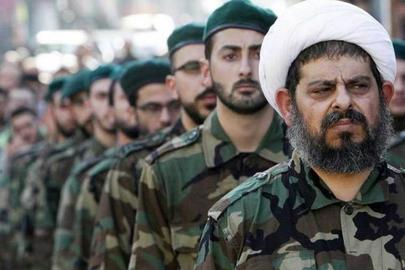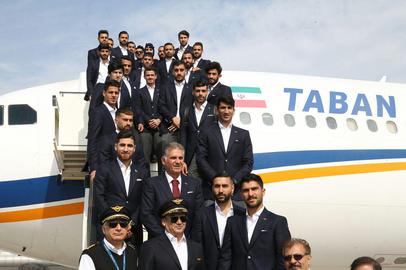According to Iran’s constitution, the main mission of the Islamic Revolutionary Guards Corps (IRGC) is "to safeguard the Islamic Revolution of Iran and its achievements.” The Revolutionary Corps’ charter emphasizes "cooperation between the Revolutionary Guards and the Artesh [Iran’s regular army] when necessary in order to protect the country’s independence and territorial integrity.” However, the main task of the Revolutionary Guards is not the protection of Iran’s borders. It is to protect the Islamic Revolution, which, in the Islamic Republic’s political lexicon, has a meaning that goes beyond the geographical boundaries of Iran.
In light of the global mission that was defined for the Revolutionary Guards, in March 1981, two years after the establishment of the Islamic Revolutionary Guard Corps, the Liberation Movements Unit of the Revolutionary Guards began its activities. In June 1981, a group of representatives of Middle Eastern and North African Islamist groups traveled to Tehran to take part in a conference hosted by the Liberation Movements Unit. As part of a final resolution reached during the conference, the group demanded “the formation of a Quds Force by the Islamic Republic" in order to "liberate Quds” — meaning the Palestinians.
The Official Formation of the Quds Force
The formation of the Quds Force in Iran was anti-Israeli in nature and focused on helping forces that were actively and overtly anti-Israel. Nevertheless, the idea of "exporting the revolution" and the desire to support all pro-Iran Islamist — mainly Shia — groups, which the Islamic Republic described as "liberation movements,” resulted in the Revolutionary Guards’ support for not only Palestinian and Lebanese groups, but also for certain paramilitary forces in other countries in the region.
In 1985, on the order of Ayatollah Khomeini, the non-military duties of the Liberation Movement Unit of the Revolutionary Guards were assigned to the Ministry of Foreign Affairs to handle Tehran’s relations with affiliated groups in various countries. At the same time, all of the military duties of the former Liberation Movement Unit were transferred to the Quds Force.
At first, the main task of the Quds Force was to confront Saddam Hussein’s army during the war. In order to do so, Iran aimed to use the potential of Saddam's opponents in the Kurdish and Shia regions of Iraq. Over this period, Shia opponents of the Iraqi regime, using Iranian financial and logistic support, formed the Badr Army, which included two branches, namely the Ahrar (consisting of Iraqi collaborator prisoners) and the Mojahedin (including the mainly Shia members of Saddam’s opposition). The Badr Army had very close organizational and operational ties with the Quds Force.
The Quds Force after the Iran-Iraq War
In the aftermath of the Iran-Iraq War, the Quds Force developed its activities in different countries. For instance, the force supported the troops of Ahmad Shah Masoud in Afghanistan against the Soviet army and later against the Taliban. The Quds Force was also active in Eastern Europe in 1992 during the Bosnia conflict, providing weapons as well as training and military advice to local Muslim forces against the Serbian military and paramilitary troops. In the same period, the Quds Force supported the Patriotic Union of Kurdistan, headed by Jalal Talabani, in internal conflicts in Iraqi Kurdistan, which strengthened the position of this Iran-related group in northern Iraq. The Quds Force supported — and continue to support — Palestinian militant groups such as the Islamic Jihad and Hamas, too.
In addition to these activities, the Quds Force intensified its activities to support the Lebanese Hezbollah to make this group the most powerful military force in Lebanon. This support paved the way for Hezbollah’s success in forcing the Israeli army to evacuate Lebanon in May 2000. The Quds Force’s support for this Lebanese group has continued unconditionally since then.
With the extension of the Quds Force’s operations, it was recognized as a determining power in in the Middle East. This development also increased the group’s influence within the Iranian establishment and transformed it into a key factor in the Islamic Republic’s regional diplomacy. In this regard, Akbar Hashemi Rafsanjani, the late chairman of Iran’s Discernment Expediency Council and the acting commander-in-chief of the Iranian armed forces during the Iran-Iraq War, said in 2016: "The foreign ministry has been deprived of carrying out its responsibilities in the most sensitive areas that concern us. In Iraq, Syria, Lebanon, Afghanistan, Yemen, etc, no one can send an ambassador without the approval of the Quds Force."
The Quds Force has been accused of organizing terrorist activities outside Iran. These accusations refer to a set of assassinations since the end of the Iran-Iraq War, ranging from the terror of certain deaths of Iraqi jet fighters after the war to the murder of the political opponents of the Islamic Republic in Europe and even the bombing of the Argentine Israelite Mutual Association (AMIA) in Buenos Aires. Many of these operations have been allegedly carried out by the Quds Force’s associates, including Lebanese and Palestinian operatives.
Over the course of the last decade, the Quds Force has organized militant groups in Syria, Iraq and Yemen, supported the Bahraini opposition, and provided support for certain armed groups in Pakistan and Afghanistan. The Iranian administration has not been involved in decision-making for the Quds Force’s activities, but has supplied the budget needed for such activities.
After the occupation of Iraq by US troops, the Quds Force helped anti-US guerrilla forces against the Americans, leading to heavy casualties.
After ISIS’s invasion of northern Iraq in 2014, the Quds Force escalated its operations in the country through organizing and arming Shia forces and providing them with advice. This involvement played a decisive role in ISIS’s defeat in Iraq and strengthened Iran’s position in that country.
The Quds Force played a similar role in Syria’s civil war from 2012 on, and managed to effectively help the Syrian government to overcome its armed opponents and regain control of its territory.
The Structure of the Quds Force
The Quds Force is one of the four forces of the Islamic Revolutionary Guards Corps. The three other forces of the Revolutionary Guards are the Ground Force, the Navy, and the Aerospace (Missile) Force.
The commander of the Quds Force is proposed by the commander-in-chief of the Revolutionary Guards and appointed by Ayatollah Khamenei. Until 1997, Ahmed Vahidi was the Quds Force commander. Since then, Ghasem Soleimani has been the commander of the force.
In addition to the appointment of the commander of the Quds Force, the Supreme Leader also appoints a representative to the force. The Leader’s current representative the Quds Force is a cleric named Ali Shirazi.
Although the exact number of Quds Force personnel is not clear, informed sources in Iran assert that there are not more than 10,000 troops in this elite force. But various sources have published exaggerated reports about the number of Quds Force personnel, some even estimating this number to be up to 50,000.
It must be borne in mind that even at the height of the Iran-Iraq War, the number of Revolutionary Guards troops never exceeded 250,000, and the current number of Revolutionary Guards troops, including its very large ground force, is certainly less than 200,000. As a result, it is inconceivable that up to a quarter of the entire Revolutionary Guards staff could be Quds Force members.
Also in this series:
Decoding Iranian Politics: Friday Prayers and Protests
Decoding Iran’s Politics: Is Iran the Mullah’s Regime?
Decoding Iran's Politics: Ghasem Soleimani's Role in the Future of Iran
visit the accountability section
In this section of Iran Wire, you can contact the officials and launch your campaign for various problems

























comments